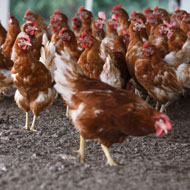UK risk of H5N8 rises to 'medium'

Defra says the threat to UK poultry farms is 'low but heightened' and depends on their individual level of biosecurity.
The risk of a wild bird infected with highly pathogenic avian influenza H5N8 entering the UK in the coming weeks has been increased from 'low' to 'medium'.
Eight countries in Europe reported numerous detections of the strain between 3 and 11 November. Defra says the threat to UK poultry farms is 'low but heightened' and depends on their individual level of biosecurity.
Outbreaks have been reported this month in Austria, Croatia, Denmark, Germany, Hungary, the Netherlands, Poland and Switzerland. Affected wild bird species include tufted ducks, coots, common pochard, gulls, curlews, wild geese and swans.
The number, rate, mortality and geographic spread of these new cases is 'significant' according to Defra. The mortality events and species affected may indicate changes in the virus pathogenicity and/or host specificity, but there are 'significant uncertainties' at this early stage.
Findings suggest at least two potential migration routes for infected wild birds and migratory birds are currently moving from the Baltic into north west Europe and the UK.
An updated outbreak assessment by Defra stated: '…The risk to the UK of the incursion of a wild bird infected with H5N8 HPAI in the coming weeks has significantly increased to medium from low.
'The risk to poultry farms will depend on their level of biosecurity, but generally we consider at the present time it remains low but heightened.'
Poultry keepers are being reminded to maintain high standards of biosecurity, remain vigilant and report suspect clinical sign promptly.



 The latest
The latest